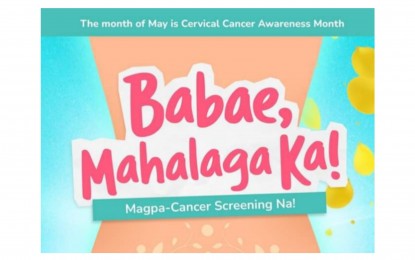
BACOLOD CITY–The Department of Health Western Visayas Center for Health Development (DOH WV CHD) urged Negrense women to undergo screening to prevent cervical cancer, the second leading cancer among females in the Philippines.
In line with Cervical Cancer Awareness Month this May, some 23,457 women in Negros Occidental and 5,965 in Bacolod City comprise the target population for screening in coordination with the local health offices and health facilities.
Dr. Aimee Marie L. Gayomali, medical officer IV and head of the DOH WV CHD integrated non-communicable disease prevention and control program, said cervical cancer screening is available in rural health units and government and private hospitals.
“Target population is 30 to 65-year-old women, but since the coverage was low in previous years, now the target of the DOH central office is five percent of the total population. This is an intensified campaign for May, June, and July, but this campaign is perpetual until we eliminate cervical cancer,” she said.
Regular screening is through a pap smear or visual inspection with acetic acid as an alternative.
Dr. Joy David Vallega, a gynecologic oncologist and medical specialist at Corazon Locsin Montelibano Memorial Regional Hospital, said the DOH aims to reach the five percent target population this year.
“A patient or woman just needs to visit health centers and hospitals to avail of the service. It is available, it’s free actually,” she added.
In a statement, DOH-WV CHD Regional Director Adriano Suba-an said there are three significant things to remember to beat cervical cancer.
“Get informed. Get vaccinated. Get screened. By these proactive steps, every Juana can safeguard her health and well-being and build protection against cervical cancer,” he added.
Suba-an said that the DOH-WV CHD also strongly advocates for the eligible population to get vaccinated since human papillomavirus (HPV) vaccines can help protect against cervical cancer.
Cervical cancer caused by an infectious agent, particularly HPV, is transmitted through sexual intercourse.
The most susceptible are those who have multiple sexual partners, those whose sexual partners have several sexual partners, and those who have had sexual intercourse at a very young age. (PNA)
